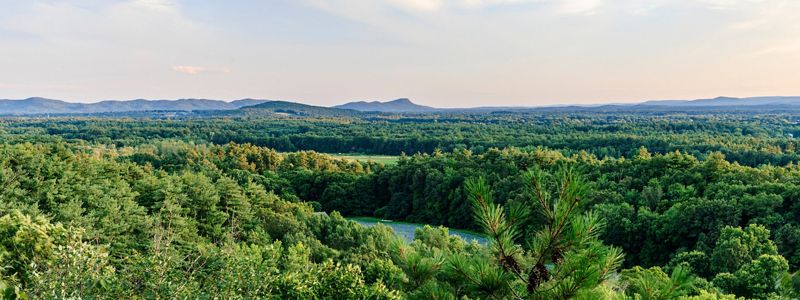
Policy Priorities in Massachusetts
On Beacon Hill, The Nature Conservancy advocates for and advances policy to address the climate and biodiversity crises.
Explore our latest priorities in the Commonwealth
At The Nature Conservancy (TNC), we have set ambitious 2030 goals to slow the interconnected crises of climate change and biodiversity loss. Policy is an essential tool to protect the lands, waters and people of Massachusetts, and forward-thinking policies have made the Commonwealth shine as a national leader in addressing climate change.
Our policy and partnerships team advances policy goals that are nonpartisan, ambitious and grounded in science. We pride ourselves on a collaborative, solutions-based approach that drives toward transformational change.
We work to influence policy, planning and implementation at the federal, regional and state levels by building trusting relationships and partnerships with decision makers, state agencies, community-based organizations, nonprofit partners and other key stakeholders. Our goal is to balance community priorities and foster opportunities to get to “yes.”
Learn More: Our Current Legislative Priorities
Throughout the 2025 - 2026 legislative session in Massachusetts, TNC will be focused on advocating for several bills that support our goals for addressing and responding to climate change, and ensuring healthy lands, waters, coasts and the ocean.
Nature and Climate
Nature-based solutions use nature or natural systems to address both the causes and impacts of climate change. Natural-climate solutions, a type of nature-based solution, include protecting, restoring and better managing the region's forests, farms and wetlands to help reduce and remove carbon from our air and retain stored carbon. Restoring the functions of these ecosystems also helps strengthen communities in the face of increasingly extreme and expensive natural events like flooding, drought and heat.
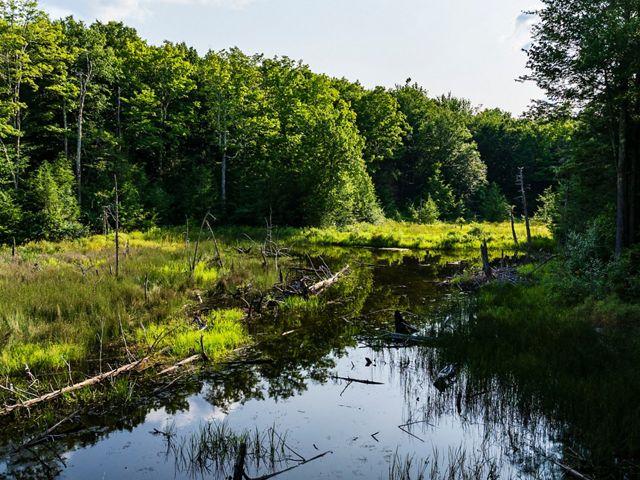
The Nature Conservancy in Massachusetts prioritizes policy actions that position nature-based solutions as the new normal for addressing climate change. By helping the state set ambitious goals, planning for a climate-smart future, advancing significant funding and key legislation and focusing on solutions for under-resourced communities, we aim to help ensure a more resilient future for people and nature in Massachusetts. Some examples include:
-
Natural and Working Lands Policy and Funding
The Commonwealth has embraced the role of natural and working lands to help draw carbon pollution from the air and keep it stored in vegetation and soil. We are working to increase the pace and scale of these efforts to protect, manage and restore these important lands to meet Massachusetts’ climate goals. TNC also co-chairs the working group for Natural and Working Lands on the state's climate council. Read more about current legislation to invest in natural and working lands.
-
Drought and Flood Disaster Prevention Legislation
Climate change is already increasing the frequency and severity of droughts and floods. We support legislation that would implement recommendations in the state's Drought Management Plan and take a proactive approach to drought response across regions. We also support legislation to proactively eliminate the risk of catastrophic flood damage and help people move out of harm’s way, while conserving land, creating parks and restoring wetlands. Take a look at the state's Drought Management Plan.
WIN: Municipal Vulnerability Preparedness Program
Communities across Massachusetts are taking charge of their future through the Municipal Vulnerability Preparedness (MVP) program—an initiative by the state Executive Office of Energy and Environmental Affairs and local governments, launched in collaboration with TNC in 2017. Since then, 349 of 351 municipalities across the Commonwealth have taken action to address climate change impacts using the MVP program. MVP provides planning grants to towns and cities so they can host community workshops to prioritize and plan their response to climate change impacts. Then, action grants are available for implementing their highest priority projects.
Stay up to date on our policy efforts!
Sign up to receive our e-newsletter to get updates on our policy initiatives in Massachusetts and beyond, as well as all our other work.
Reducing Greenhouse Gas Emissions
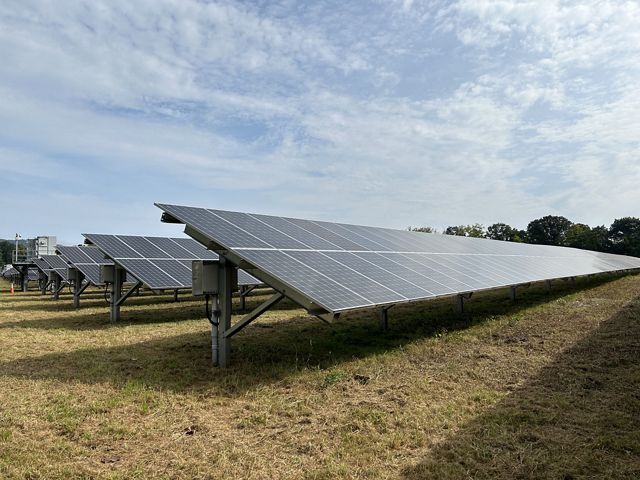
TNC influences and informs policy that helps reduce harmful emissions at three levels:
- Reducing energy use
- Changing the energy we use from fossil fuels to environmentally preferable sources
- Transitioning buildings and transportation from fossil fuels to electricity
Supporting both large-scale renewable energy deployment, like offshore wind, and small-scale projects, like heat pumps, in individual homes also results in climate resilience, better consumer protection and workforce development opportunities.

Over the years, TNC has advocated for reduced emissions and the clean energy transition by:
-
Sitting on the state's climate council, called the Implementation Advisory Committee (IAC), since its inception in 2012. The council brings together experts to provide advice to the Executive Office on reducing emissions and sequestering carbon in natural and working lands and informs the development and implementation of the Clean Energy and Climate Plan. Read more about the IAC.
-
Serving as a member of Governor Healey’s Commission on Energy Infrastructure Siting and Permitting, which made recommendations and proposed legislation to accelerate the deployment of land-based renewable energy storage and transmission and provide better outcomes for people and nature. TNC has been a leading voice on site suitability and early community engagement to ensure that projects are sited, designed and operated more efficiently and equitably. Learn more about the commission.
-
Advocating in support of policies that require utilities to procure large amounts of renewable energy, such as that from offshore wind, while enforcing meaningful criteria for environmentally-preferable siting and operations, workforce development opportunities and a voice for communities. Check out TNC's updated Marine Mapping Tool, which can help developers when siting offshore wind.
Conservation and Biodiversity
The policy team advances federal and state efforts to protect, manage, restore and connect our lands, waters and coasts, and advocates for the funding needed to do so. These actions support healthy ecosystems that sequester carbon, support diverse species and habitats, improve water and air quality and uplift local communities.

We are deeply engaged in helping to develop policy recommendations as part of several key conservation and biodiversity initiatives spearheaded by the Healey-Driscoll Administration, including the Forests as Climate Solutions initiative, the Biodiversity Executive Order, and the effort to streamline permitting for salt marsh restoration projects, aquaculture and dam removals.
-
TNC leads the effort to raise the annual cap on the Massachusetts Conservation Land Tax Credit (CLTC) program, an important and cost-effective tool to permanently protect critical natural resources. Currently, the program has a $2 million annual cap, which is too low and leads to a multi-year waitlist of landowners hoping to protect their properties. Read about why this is essential.

WIN: The Public Lands Preservation Act
After over 20 years of advocacy, An Act Preserving Open Space in the Commonwealth, also known as the Public Lands Preservation Act, was enacted in 2022, strengthening and codifying the Commonwealth’s longstanding No Net Loss policy. This policy states that any public open space (Article 97 land) converted to a different use must be replaced with land of equivalent financial and natural resource value and defines a process for doing so. The final law provides clarity and transparency to ensure no net loss of conservation land across the Commonwealth.
Capacity and Funding
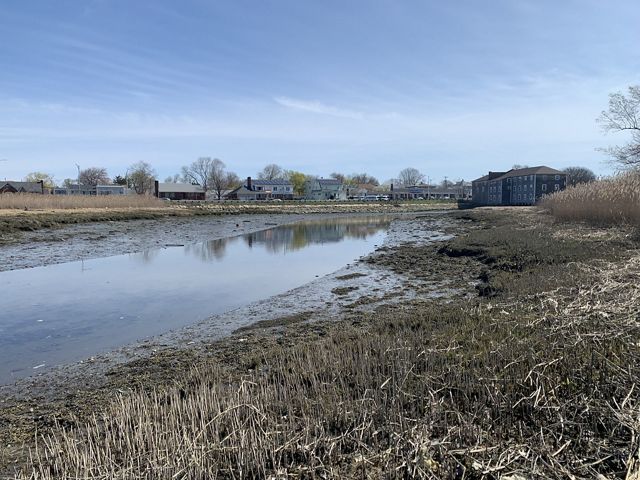
To build a more resilient future for everyone in Massachusetts, it is essential that communities have input in decisions that affect them. Current funding and programs for cliamate mitigation and adaptation often don't meet community needs, so TNC partnered with community-based organizations to learn about where funding is needed to improve resiliency.
TNC also recognizes the importance of ensuring that the state and municipalities have the resources they need to develop and implement on-the-ground projects. We advocate for funding and capacity building through the state budget and bonds, federal funding opportunities and assistance for local organizations and municipalities.
A few examples of this work include:
-
TNC has been collaborating with community-based organizations to co-create new sustainable sources of funding. Our goal is to leverage public and private resources to creatively fill capacity needs and advance durable, community-driven solutions for those impacted by extreme weather and other climate challenges. Read more about this initiative.
-
As a member of the Green Budget Coalition, TNC advocates annually for increased funding for key environmental agencies within the state operating budget. View the Coalition’s Fiscal Year 2025 Priorities.
-
TNC co-led a coalition seeking to allocate a portion of the $5.3 billion in American Rescue Plan Act (ARPA) funding Massachusetts received from Congress toward conservation, outdoor recreation, restoration and climate resilience. Between two rounds of ARPA funding, the coalition succeeded in getting $315 million invested in nature-based solutions, climate resiliency, land conservation, ecological restoration, tree planting and park creation. Learn more about ARPA.
From Massachusetts to Washington, D.C.
The Massachusetts team also works with TNC’s federal policy team to advance policies that align with the organization’s land, water and climate priorities. Through robust partnerships with the Massachusetts congressional offices, we advocate for legislation that supports strong funding for conservation programs and creative climate solutions. In addition to priorities of national significance, we also work with our delegation on regional issues like land and water connectivity in the Appalachians, renewable energy deployment—including offshore wind—and funding for coastal and ocean programs, like the TNC-led Supporting Oyster Aquaculture and Restoration (SOAR) program.
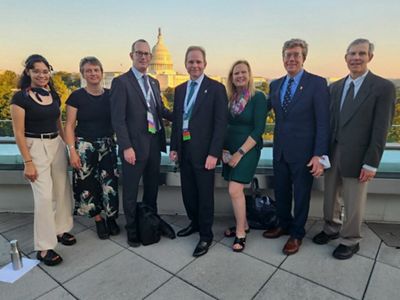
WIN: Conte National Fish and Wildlife Refuge
Policy and conservation staff from TNC in Massachusetts, Connecticut, Vermont and New Hampshire, along with the organization Friends of Conte, regularly identify projects and advocate for receiving federal Land and Water Conservation Fund (LWCF) funding for the Silvio O. Conte National Fish and Wildlife Refuge that spans the Connecticut River in all four states. In FY22, the Refuge received $17.2 million in LWCF funding for land acquisition, the most that has ever been allocated to the Refuge at one time. This funding will allow the Refuge to carry out larger projects in the future and take advantage of significant, timely opportunities.
WIN: High Street Dam Removal
In July 2023, after more than 15 years of partnership and planning, construction crews removed the High Street dam and bridge on the Town River in Bridgewater. It was one of the oldest bridges in the state still in use and had numerous structural problems. Removing the dam improves habitat and fish passage from Narragansett Bay to the headwaters at Lake Nippenicket, all part of the larger Taunton River Watershed. The removal also reduces flood risk for nearby communities, as a new bridge designed to accommodate high river flows was constructed. This project was funded in part by a $1.55 million U.S. Fish and Wildlife Service National Fish Passage Program grant from the Bipartisan Infrastructure Law, which was leveraged along with $6.7 million in other public funds from the state and NOAA.
Massachusetts Policy Resources
Let's Shape Our Future Together
Sign up to receive monthly policy and conservation news from Massachusetts.
